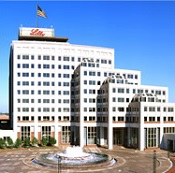 AstraZeneca ($AZN) has found a buyer for a 50/50 deal on its BACE drug for Alzheimer's. Downsizing its role in neurosciences, the U.K. pharma giant put out the word some months ago that it would like to find someone to come in and take over the lead development role for AZD3293, a beta secretase cleaving enzyme inhibitor. And now longtime Alzheimer's player Eli Lilly ($LLY) has agreed to fill the spot, paying $50 million in a near-term milestone and taking charge of the development work in a collaboration package worth a total of up to $500 million.
AstraZeneca ($AZN) has found a buyer for a 50/50 deal on its BACE drug for Alzheimer's. Downsizing its role in neurosciences, the U.K. pharma giant put out the word some months ago that it would like to find someone to come in and take over the lead development role for AZD3293, a beta secretase cleaving enzyme inhibitor. And now longtime Alzheimer's player Eli Lilly ($LLY) has agreed to fill the spot, paying $50 million in a near-term milestone and taking charge of the development work in a collaboration package worth a total of up to $500 million.
In the deal, Lilly agreed to take charge of the planned Phase II/III study of the treatment, collaborating with the scientists in AstraZeneca's neurosciences group, while AstraZeneca handles the manufacturing. If they can gain an approval, they plan to co-promote the treatment and split the costs and revenue.
Lilly was always the most likely candidate to partner on this drug once AstraZeneca signaled its intentions. A little more than a year ago Lilly was forced to dump its own BACE program for the memory-stealing disease--the drug LY2886721--after investigators linked it to toxicity in liver tests.
For Lilly the clinical failure last year marked the latest in a string of setbacks for Alzheimer's and another black eye for its R&D division. In 2012 Eli Lilly famously--though reluctantly--conceded that its Phase III study for solanezumab was a failure, forcing it to go back to the drawing board to redesign a new Phase III approach tailored to early-stage patients. And that flop followed the failure of Lilly's semagacestat, a gamma-secretase therapy that harmed patients who took it. Overall clinical trial failure rates in Alzheimer's have been estimated as high as 99% in the past decade.
Over the past two years BACE has become a central R&D focus in later-stage Alzheimer's studies. Merck has the leading program in the clinic, though Roche scrapped an early-stage effort of its own without ever explaining why.
The potential role of BACE inhibition in controlling the disease centers on the notion that eliminating toxic loads of amyloid beta in the brain will slow or stop the disease. The theory here is that a beta secretase approach can throw a monkey wrench into the body's assembly line for amyloid, though there have been some troubling questions about long-term safety. Some investigators fear that a BACE strategy could also interefere with myelin, which would present a serious threat to anyone taking the drug. And not everyone believes that amyloid beta should be the actual target, noting that the protein can cluster in the brains of people who don't develop the disease.
Lilly's first payment represents exactly 1% of the peak sales value AstraZeneca recently assigned to the drug.
Back when it was making its case against a Pfizer takeover AstraZeneca estimated that AZD3293 could earn a non-risk-adjusted $5 billion in yearly sales--with a 9% chance of success--while some analyst estimates ranged from one-tenth of that to $3 billion a year. They may as well have cited $10 billion, the usual number that some people come up with in the event an Alzheimer's drug is approved for a mass market like this.
 |
| David Ricks, president of Lilly Bio-Medicines |
"Lilly has been committed to research in Alzheimer's disease for more than 25 years, and we're dedicated to developing new medicines that can change and modify the course of this devastating disease," said David Ricks, Lilly senior vice president and president, Lilly Bio-Medicines, in a statement. "Lilly's pipeline of potential medicines and diagnostic agents targeting the known hallmarks of the disease has been bolstered today by this alliance with AstraZeneca, a strong strategic partner who shares our passion to bring new medicines to patients suffering from this debilitating illness. This alliance moves us one step closer to achieving our goal of making Alzheimer's dementia preventable by 2025."
- read the release